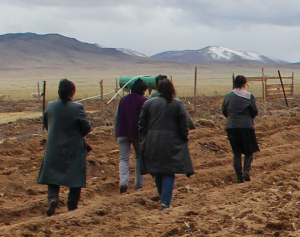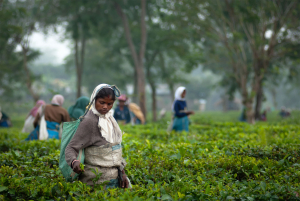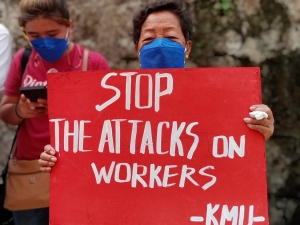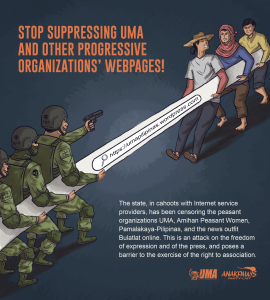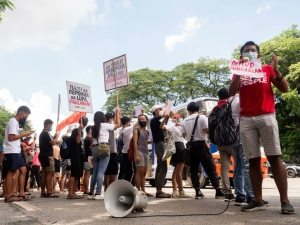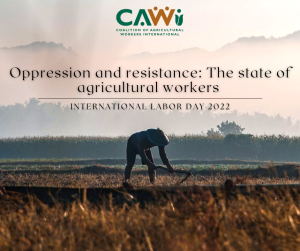Joint statement issued by the Asian Peasant Coalition (APC); Coalition of Agricultural Workers International (CAWI); Asian Rural Women’s Coalition (ARWC); People’s Coalition on Food Sovereignty (PCFS); PAN Asia Pacific (PANAP); Kilusang Magbubukid ng Pilipinas (KMP); Aliansi Gerakan Reforma Agraria (AGRA) of Indonesia; Sarawak Dayak Iban Association (SADIA) of Malaysia; Pakistan Kissan Mazdoor Tehreek (PKMT); Roots for Equity (ROE) of Pakistan; National Fisheries Solidarity Movement (NAFSO) of Sri Lanka; Human Development Organization (HDO) of Sri Lanka; Union of Agricultural Workers (UMA) of the Philippines; Farm Worker Association of Florida (FWAF) of the US; Society for Rural Education and Development (SRED) of India; Tamil Nadu Women’s Forum (TNWF) of India; Centre for Human Rights and Development (CHRD) of Mongolia; Food Coalition of Mongolia; and General Agricultural Workers Union (GAWU) of Ghana
We support the Asian Peasant Coalition’s (APC) declaration of 29 March as the “Day of the Landless”. On this day 12 years ago, a historic event in the people’s struggle for land and resources was made. The APC was founded as a collective response of the region’s farmers, landless peasants, farmworkers, peasant women, fisherfolk, dalits, herders, pastoralists, indigenous peoples, rural youth and their allies against imperialist and feudal oppression and exploitation.
We now celebrate this landmark in our struggle with the declaration of the “Day of the Landless”. Along with it we vow to commit ourselves to further advance our struggle for the people’s collective rights to land and resources to meet their economic, social and cultural needs.
Despite our victories, we note with grave concern how the land and resource grabbers – mainly big corporations supported by governments and especially under neoliberal globalization – continue to displace local communities and to intensify the plunder of resources in the name of corporate profits.
Foreign companies, mainly from the rich countries, buying or leasing agricultural land, forests, mining areas and others in the poor countries characterize recent cases of land and resource grabbing. Local elites in business and politics play a central role in facilitating these deals.
Land and resource grabbing happen amid lack of genuine agrarian reform and neoliberal restructuring of agriculture. They create the condition for the intensifying monopoly control of landlords and big corporations over massive areas of farmlands, forests, water resources, etc.
Thus, landlessness and marginalization in access to productive resources remain pervasive in the vast countryside especially in the poor countries. About a quarter of the world’s 1.1 billion poor people are landless, according to the latest data from the International Fund for Agricultural Development (IFAD). Almost 200 million do not have enough land to provide a decent standard of living. (See here)
Lack of access to land and resources results to hunger and poverty, which are most intense in the rural areas. It is indeed ironic that among those who suffer severe hunger are those who directly produce the world’s food.The UN Conference on Trade and Development (UNCTAD) says that some 70% of one billion people worldwide who chronically suffer from starvation are themselves small farmers or agricultural laborers. (See here)
Women are the backbone of the agricultural economy, yet rural women are among the most affected. Increased poverty and hunger as a consequence of land and resource grabbing, for instance, impact more heavily on rural women as they play a key role not only in managing the household budget and securing food for the family, on top of their role as direct contributor to the family income, but as land rights defenders themselves especially given the fact that genuine equal access and control over land and resources strengthen equality. Women’s land rights intersect with other problems such as discriminatory inheritance patterns, agriculture and development issues, gender-based violence, the appropriation of communal and indigenous lands, as well as gendered control over economic resources and the right to work.
Land and resource grabbing violates the people’s economic, social and cultural rights. Worse, the people’s resistance and efforts to defend such rights are met with systematic and brutal violence by the land and resource grabbers. This has resulted in the gross and blatant violation of the political and civil rights of affected communities and activists.
We are alarmed how human rights atrocities have intensified in militarized rural and indigenous areas where there are conflicts arising from land and resource grabbing. These areas are being militarized to secure the operation of local and foreign agribusiness corporations and protect their land and resource grabbing activities. Often, the perpetrators of human rights atrocities are State security forces themselves as well the hired private security personnel and goons by the corporations. Often, their abuses are being committed with impunity.
Data compiled by Global Witness show that between 2002 and 2013, some 908 land and environmental activists were killed in 35 countries. Just over 1% of known cases have been resolved. (See here)
Surely, these numbers, alarmingly high as they are, still do not reflect the true extent of the political killings related to anti-land and resource grabbing struggles. Many cases, in particular those in the remotest and farthest villages, remain unreported and undocumented.
Unlawful arrests and detention, enforced disappearance, harrassment, legal persecution and a host of various human rights violations against local communities and their supporters are being committed on a regular basis. The result is that many communities are forced to evict the land they have tilled and enriched for many decades. Instead of being given land, governments are forcefully taking away land and displacing hundreds and thousands of communities across Asia and the Pacific.
These are indeed daunting challenges that we face. But we are undeterred. Today, as we strengthen the APCs declaration of the “Day of the Landless”, we are also launching our “NO LAND, NO LIFE!” campaign. It is an initiative to highlight cases of land and resource grabbing in the region as human rights violations. Through collective action, we will engage the authorities at national, regional and global levels to address these human rights atrocities. (More on the campaign here)
As the land and resource grabbers remain determined to take away what rightfully belongs to the people, we must be more resolute than ever in our struggle to defend land, resources and human rights. ###


